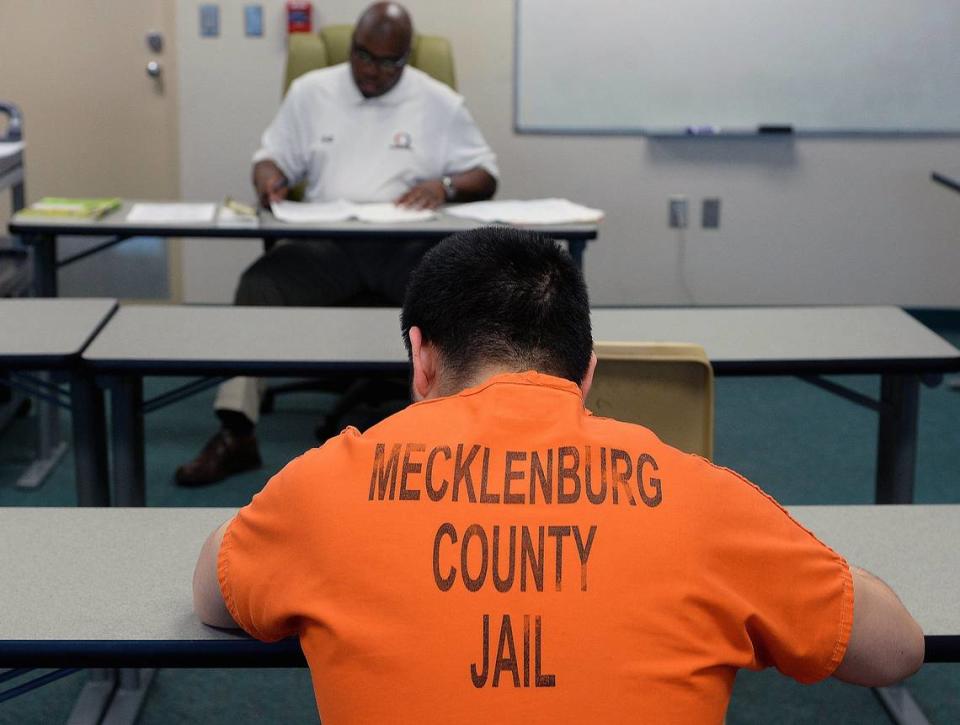NC jails rife with mental health problems. Sheriffs look to Medicaid expansion for relief
Across North Carolina, people who struggle with mental health and substance abuse find themselves walking through a revolving door, going from the streets to jail and to the streets again ad nauseam.
But the jails are not equipped for the job of fully caring for them, nor should they be, say some sheriffs who are hopeful that Medicaid expansion will alleviate problems in the justice system.
“We don’t need to have a discussion on how to turn a jail into a mental health facility,” Orange County Sheriff Charles Blackwood told others on the Governor’s Crime Commission at a Thursday meeting. “That’s misguided at best.”
Still, when he read over a recent evaluation of his own jail, a familiar question popped up: Why were some people there?
The problem looms over North Carolina’s criminal justice system, but some sheriffs and health professionals hope that Medicaid’s recent expansion will alleviate it. With more people covered, some might never have an episode that lands them in jail.
The state’s expanded Medicaid program launched this month, opening the door for hundreds of thousands of people to access health insurance who previously made too much to get assistance and too little for subsidies through the marketplace created by the Affordable Care Act.
More than 600,000 North Carolinians, which is about 5% of the state’s population, became eligible for Medicaid with its expansion. Nearly 300,000 were automatically enrolled.
Jails not prepared
Jails in North Carolina and other southeastern states are not always equipped for people who need health care, an October study from researchers at the University of North Carolina found.
“Our results clearly show that as nursing coverage goes down, officers are tasked with more and more healthcare duties,” the researchers said. “This is concerning because the basic healthcare training to become certified as an officer is typically very modest compared to that of dedicated healthcare personnel; yet, their actions can have a profound impact on the health of jailed people, particularly as gatekeepers to medical personnel.”
Despite that, county jails have become de facto mental health facilities, Eddie Caldwell, the North Carolina Sheriffs’ Association’s executive vice president and general counsel, told The Charlotte Observer.
The Sheriffs’ Association, a statewide lobbying group that represents sheriffs’ offices, “strongly” supported Medicaid’s expansion, Caldwell said.
There could be two direct benefits, he said. People could receive the health care they needed all along, and never commit a crime and go to jail, he said. Others who still get arrested will be in better physical and mental shape, taking some burden off jail staff.
“That’s going to reduce not only the costs for the jails, but the problems for the jails,” he said.
Data on North Carolina’s jail recidivism rate is limited. But a 2022 report from the North Carolina Sentencing and Policy Advisory Commission found that 41% of people in prison (19,484 of 47,090 people) were arrested again within two years.
What could change in NC jails
The North Carolina Department of Health and Human Services applied for programs that could help inmates, Justice Systems Innovation Lead Stella Bailey told the Governor’s Crime Commission Thursday. Those include the Justice-Involved Reentry Initiative. It would cover case management, counseling and behavioral therapies and medications, among other things, and begin 90 days before an inmate’s release.
And then there’s Caldwell’s hope that the number of inmates will shrink with more North Carolinians receiving health care.
“The Medicaid expansion, the dollars going to this population, the change in the way they live their lives — hopefully, it’s going to all but eliminate that population ever getting to us,” Blackwood, the Orange County sheriff, told the commission Thursday.
Law enforcement officers still find themselves taking inmates on familiar drives to mental health facilities, he said.
“We always hope that initiatives like this will help our community and prevent those in need from becoming residents inside the Detention Center,” Mecklenburg County Sheriff’s Office spokesperson Bradley Smith said of Medicaid’s expansion.
He added that it was too soon to say what effect it might have.



